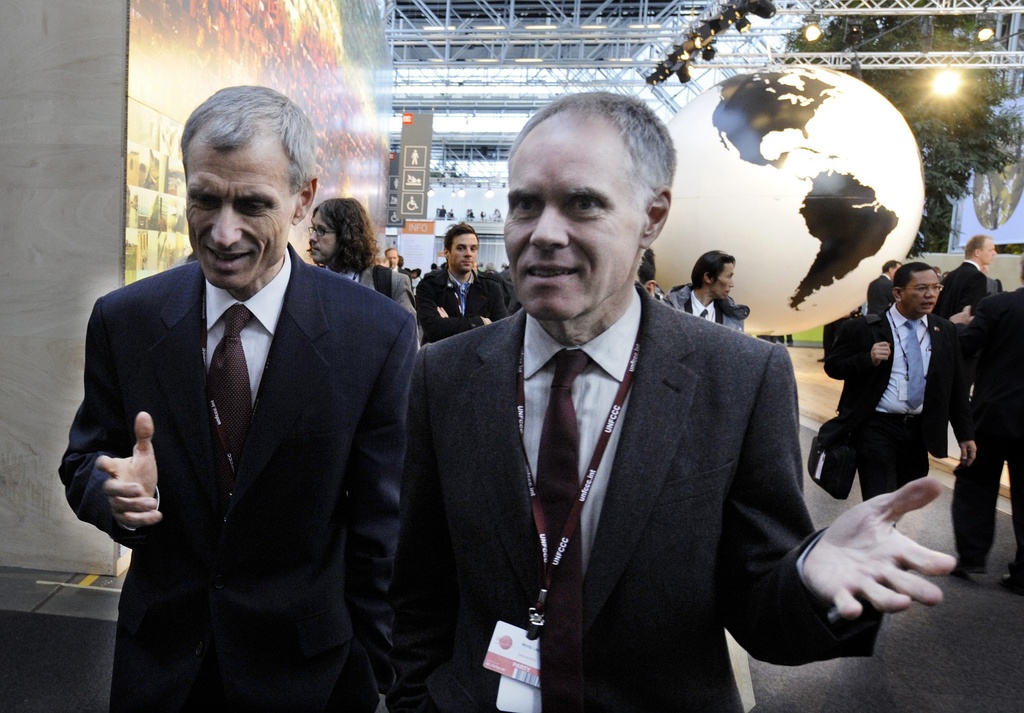
Leuenberger says Copenhagen outcome “insufficient”

Environment Minister Moritz Leuenberger on Saturday had some kind words for the United Nations climate conference but criticised the result as “insufficient”.
Bitterly divided, the two-week meeting barely avoided collapse and countries said they would try again for a new global pact by the end of 2010.
Following resistance from a small group of developing countries, the conference’s 193 participating nations will “take note” of the three-page Copenhagen Accord but not all will endorse it.
Speaking in the Danish capital, Switzerland’s Leuenberger said: “This is a success in terms of climate policy. Most counties, including many of the emerging and developing countries, committed themselves in a biding way to reduce their emissions. This would not have been possible two years ago.”
He admitted the result was “insufficient to combat the threat climate change”.
The result followed two years of international negotiations, a furious final two days of climate diplomacy and an all-night plenary session.
The non-binding deal, led by the United States, China, India, South Africa and Brazil, calls for “deep cuts in global emissions” and sets a target of limiting global warming to a maximum two degree Celsius rise over pre-industrial times and holds out the prospect of $100 billion (SFr104 billion) in annual aid from 2020 for developing nations.
The plan does not specify greenhouse gas cuts needed to stave off dangerous changes such as more floods, droughts, mudslides, sand storms and rising seas.
Opposition
“We had hoped that all countries would have been obliged to reduce their emissions, and for the creation of a mechanism for oversight and funding around the world,” Leuenberger said. “Copenhagen did not reach that and I deplore it.”
Leuenberger acknowledged difficulties in the process and said the conference had not met Switzerland’s expectations. The UN had put “too much in this package; it was impossible to settle,” he said.
Delegates of Venezuela, Bolivia, Cuba and Nicaragua angrily denounced the agreement, saying it would not help address global warming and was unfairly worked out behind closed doors at the conference.
An all-night marathon negotiating sessions punctuated increasingly by irritable exchanges between countries.
One Saudi delegate said it was without doubt “the worst plenary I have ever attended.”
“There will always be minorities who refuse to agree,” Leuenberger said.
“Very disappointed”
Many other nations said the deal fell far short of UN ambitions for Copenhagen, meant as a turning point to push the world economy towards renewable energies such as hydro, solar and wind power and away from fossil fuels. Non-governmental organisations weren’t happy either.
“We are very disappointed with the outcome of Copenhagen,” said Patrick Hofstetter, head of climate policy at WWF Switzerland. “Copenhagen will probably be remembered as a missed opportunity to put the world on the path of a binding climate agreement. I see a very difficult 2010.”
“The decision has been very difficult for me. We have done one step, we have hoped for several more,” said German Chancellor Angela Merkel.
New Zealand’s climate change ambassador, Adrian Macey, called it “a modest deal.” More than anything, Macey found the UN process on climate change “appalling”.
John Sauven, executive director of Greenpeace UK, decried that “there are no targets for carbon cuts and no agreement on a legally binding treaty.
Before leaving Copenhagen on Friday evening, US President Barack Obama said the deal was a starting point.
“We’ve come a long way but we have much further to go,” he said of the deal.
“The meeting has had a positive result, everyone should be happy,” said Xie Zhenhua, head of China’s climate delegation.
swissinfo.ch and agencies (with input from Pierre-François Besson in Copenhagen)
Nearly 200 countries met in Copenhagen until December 19, trying to reach a global agreement to follow or extend the Kyoto Protocol, which runs out at the end of 2012.¨
The final deal does not require countries to take concrete action or set binding targets.
In the two years leading up to the conference, it was hoped Copenhagen would reduce greenhouse gas emissions so that temperatures would not rise globally by more than two degrees in comparison with the pre-industrial age.
The UN Intergovernmental Panel on Climate Change (IPCC) says industrialised countries need to reduce their emissions by 25% to 40% of their 1990 levels by 2020.
It has called on the rich nations to reduce their greenhouse gas emissions by 80% to 95% by 2050, and developing countries by 50%.
The Swiss government proposes that Switzerland should reduce its emissions by 20% of their 1990 level by 2020.
Switzerland said it was prepared to increase its target to 30%.

In compliance with the JTI standards
More: SWI swissinfo.ch certified by the Journalism Trust Initiative




























You can find an overview of ongoing debates with our journalists here . Please join us!
If you want to start a conversation about a topic raised in this article or want to report factual errors, email us at english@swissinfo.ch.